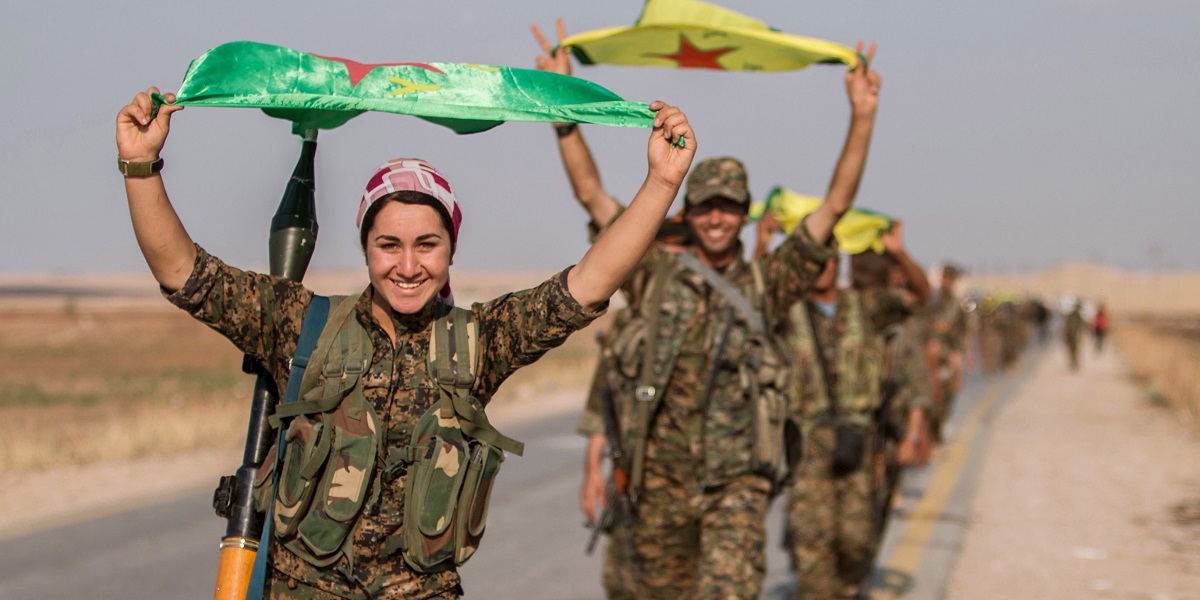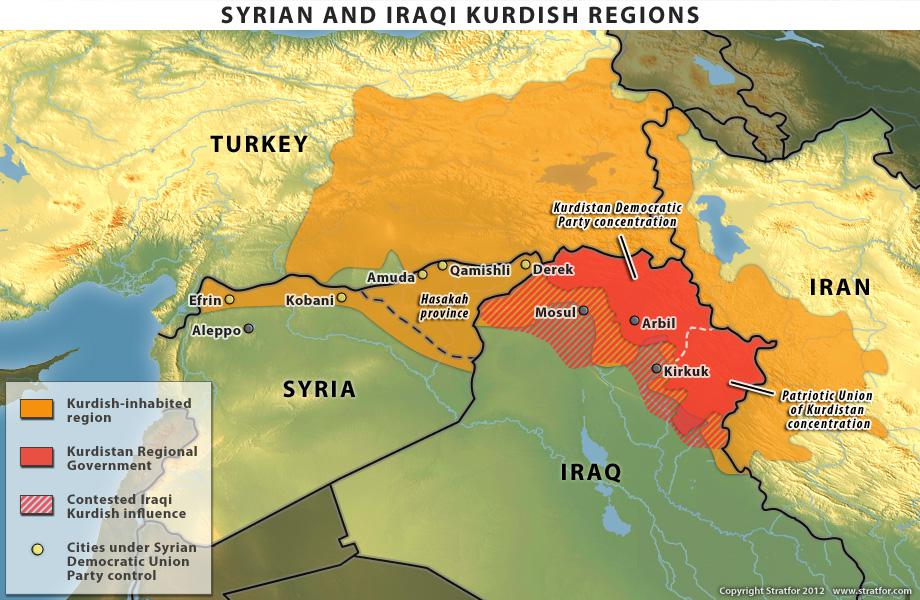In January 2018, the United States announced the creation of a new border security force in the territory controlled by Syrian Kurds along the border with Turkey. After this announcement, Turkish President Recep Tayyip Erdogan declared that his army would crush this new Kurdish “army of terror”.

Kurdish fighters gesture while carrying their parties’ flags in Tel Abyad of Raqqa governorate after they said they took control of the area June 15, 2015. Syrian Kurdish-led forces said they had captured a town at the Turkish border from Islamic State on Monday, driving it away from the frontier in an advance backed by U.S.-led air strikes that has thrust deep into the jihadists’ Syria stronghold. The capture of Tel Abyad by the Kurdish YPG and smaller Syrian rebel groups means the Syrian Kurds effectively control some 400 km (250 miles) of the Syrian-Turkish border that has been a conduit for foreign fighters joining Islamic State. Picture taken June 15, 2015. REUTERS/Rodi Said TPX IMAGES OF THE DAY – RTX1GPFR
Turkey has been battling armed Kurdish fighters for decades in the southeastern part of the country. In particular it is fighting is the Kurdistan Workers Party, or PKK, which have separatist roots. Turkey considers the PKK a terrorist organisation, and sees the armed Syrian Kurdish groups as an extension of the PKK. The Syrian Kurds in their turn claim that their army, the People’s Protection Units (YPG), has no ties with PKK but it is evident that the bonds exist, and that the two formations share the same long-term goal: an independent Kurdish state. We do not forget the Kurdish referendum on Sept. 25, which produced an overwhelming “yes” for independence, angered Iraq’s central government and neighbours Iran and Turkey.
Turkey, therefore, has launched an army operation in the northern Syrian. Turkish ground troops have crossed the border into Syria alongside thousands of Free Syrian Army (FSA) fighters, as part of the so-called Operation Olive Branch. And on top of that, they have already announced further operations that will eliminate the rest of the Kurdish-led Syrian forces. Particularly Turkey’s President Recep Tayyip Erdogan said that the operation in Afrin would be followed by a push into the northern town of Manbij where the US-allied Syrian Kurdish armed fighters have a large presence.
Yes, it’s like everyone has a popcorn image of who has contents the expansion of Islamic State. The United States and all military forces against ISIS have used Kurds to eliminate the troops of Daesh in eastern Syria. The United States has relied on the YPG as a vital ground component of its war against Islamic State, and has backed the group in other Kurdish-run regions in northern Syria along the border with Turkey. But now Washington is betraying and abandoning its Kurdish allies, because Turkey is an important country in the Middle East, a NATO ally – endowed with the second largest army of the alliance – that controls the straits that allow the Russians naval access to the Mediterranean.

The Russians are also launching calls for moderation, which means that they too will not stop the Turks. The Russian intervention in 2015 turned the tide in President Bashar al-Assad’s favour. At the end of 2016, the Syrian army took Aleppo, one of the main battlegrounds in the conflict. The Syrian government forces fought against the opposition fighters in Idlib province in eastern Syria. Thanks to the help from Russia, the forces loyal to President Assad regained most of the Syrian territory, but the biggest area remaining out of its reach is still under the Syrian Kurdish control in the north of the country.
The Damascus regime hates the fact that there are Turkish tanks on its territory, but accepts the policy of non-intervention of Moscow because it still depends on Russian and Iranian military support. However Syrian Kurds called for Bashar al-Assad’s government to send troops to help defend them from Turkish assault, turning for help to the very government from which they have sought autonomy and making it harder still for balance of the area.
The harsh reality is the game never ends, the main actors turn on each other, they cheat on each other all the time. The truth is that everyone lies, everyone has hidden goals. The main focus would be to restore peace and security in the region. But to achieve this we must put an end to appalling crisis that affects the Kurds in Syria, Iraq and Turkey. Otherwise there’ll never be peace in Syria.






